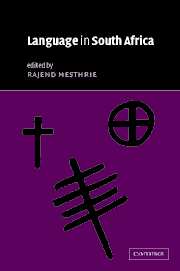Book contents
- Frontmatter
- Contents
- List of maps
- List of contributors
- Acknowledgements
- List of phonetic symbols
- List of abbreviations
- Introduction
- Part I The main language groupings
- Part II Language contact
- 9 Fanakalo: a pidgin in South Africa
- 10 Mutual lexical borrowings among some languages of southern Africa: Xhosa, Afrikaans and English
- 11 Code-switching, mixing and convergence in Cape Town
- 12 Code-switching in South African townships
- 13 Intercultural miscommunication in South Africa
- 14 Women's language of respect: isihlonipho sabafazi
- 15 The sociohistory of clicks in Southern Bantu
- 16 The political economy of language shift: language and gendered ethnicity in a Thonga community
- 17 From second language to first language: Indian South African English
- 18 Black South African English
- 19 The lexicon and sociolinguistic codes of the working-class Afrikaans-speaking Cape Peninsula coloured community
- 20 An Introduction to Flaaitaal (or Tsotsitaal)
- 21 Language and language practices in Soweto
- Part III Language planning, policy and education
- Index
- References
14 - Women's language of respect: isihlonipho sabafazi
from Part II - Language contact
Published online by Cambridge University Press: 22 September 2009
- Frontmatter
- Contents
- List of maps
- List of contributors
- Acknowledgements
- List of phonetic symbols
- List of abbreviations
- Introduction
- Part I The main language groupings
- Part II Language contact
- 9 Fanakalo: a pidgin in South Africa
- 10 Mutual lexical borrowings among some languages of southern Africa: Xhosa, Afrikaans and English
- 11 Code-switching, mixing and convergence in Cape Town
- 12 Code-switching in South African townships
- 13 Intercultural miscommunication in South Africa
- 14 Women's language of respect: isihlonipho sabafazi
- 15 The sociohistory of clicks in Southern Bantu
- 16 The political economy of language shift: language and gendered ethnicity in a Thonga community
- 17 From second language to first language: Indian South African English
- 18 Black South African English
- 19 The lexicon and sociolinguistic codes of the working-class Afrikaans-speaking Cape Peninsula coloured community
- 20 An Introduction to Flaaitaal (or Tsotsitaal)
- 21 Language and language practices in Soweto
- Part III Language planning, policy and education
- Index
- References
Summary
INTRODUCTION
The 1990s witnessed an ever-quickening pace in southern Africa towards urbanisation and modernisation at the expense of custom and tradition. The socially accepted form of behaviour in a community and the customs and beliefs being handed down from one generation to the next have become blurred as the many forces being exerted upon the traditional family lifestyle take effect. The object of this chapter is to trace the development of a specific sociolinguistic phenomenon which has been particularly affected by modernisation. This concerns a language variety associated with respect practised by certain southern Bantu-speaking people, more specifically Nguni and Southern Sotho-speaking women. This chapter considers this phenomenon as related in particular to the Xhosa-speaking women.
First, it would assist those unfamiliar with this interesting linguistic phenomenon to put it in context by a hypothetical example from English. One could consider the following situation: Robert and Grace Green have three children – William, Joan and Margaret. William marries Mary and takes her home to his family. Here she is taught a new vocabulary by Joan, her sister-in-law and where necessary advised by Grace, her mother-in-law. This is because from now on she may never use the syllables occurring in the names of her husband's family, i.e. simplistically rob, ert, green, will, may and grace. Thus for the sentence ‘Grace will not eat green yoghurt’, Mary would have to say something like: ‘The older daughter of Smith refuses to eat grass-coloured yomix.
- Type
- Chapter
- Information
- Language in South Africa , pp. 277 - 296Publisher: Cambridge University PressPrint publication year: 2002
References
- 10
- Cited by



